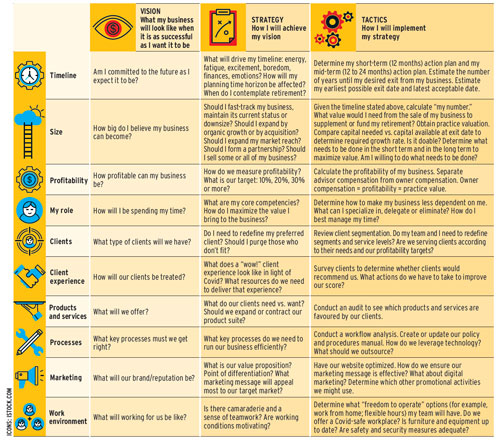
“Coach’s Forum” is a place to ask your questions, tell your stories or give your opinions on any aspect of practice management. For each column, George selects the most interesting and relevant comments from readers and offers his advice. Our objective is to build a community with a common interest in making financial advisory practices as effective as possible.
ADVISOR SAYS:
Although we are not out of the woods yet, I am optimistic that the impact of Covid-19 will continue to diminish. While we were at the height of the pandemic, I made several adjustments to my practice to cope with the disruptions and limitations.
I am happy with the outcome of those changes, and some will become permanent. However, I feel they were more reactionary than strategic, which goes against my nature. I am more of a planning person who likes to decide where I want my business to go and then works to follow the path I’ve plotted.
I want to regain control of my business and update my strategic plan. What should I consider while doing so?
COACH SAYS:
The pandemic has forever altered financial advisory practice management. Those who learn from the past two years will thrive, while those who don’t will struggle.
So, before we get to business planning for a post-pandemic world, you must ask yourself: “Given what I see as the lasting impact of the pandemic on my business, can I continue with passion and vigour?”
To assist in answering that question, you might think about the future of your business, as you have already begun to do, in the following context: which of your ambitions, activities, processes, relationships and capabilities:
- will return to “normal” (as you define it)
- have disappeared, never to return
- have changed and will stay changed?
Any financial advisor who isn’t motivated by their assessment of the industry today should be planning their exit. However, your question implies that you want to enthusiastically continue building the business you began years before we even imagined an event like the Covid-19 pandemic. So, here are some things to consider — some perpetual regardless of conditions and some specific to a post-Covid environment.
The best approach to business planning is to do it from the perspective of your clients. Organizing your business to exceed client expectations will serve you extremely well.
In doing so, however, we must acknowledge that most clients no longer think and act in all the ways they did pre-pandemic. Their need for a sense of security is heightened. They are less willing to engage with you in person. They have developed an accelerated reliance on technology for communication and transactions. Google has become their primary source of information.
Your staff members are likely to share many of these characteristics. And in our industry, competition for high-calibre, qualified staff is fierce. So I suggest thinking of your team members as “clients” of your business too. Taking their needs and expectations into account will better prepare you and your staff to meet clients’ evolving requirements.
If you are a regular reader of this column, you may recall that I like to apply a three-tier hierarchy to planning. It begins with your vision, which determines your strategy, which in turn defines your tactics. With that approach in mind, the table below should assist in addressing key areas of your business at all three levels.
This is a lot to consider, and you probably have ideas of your own. But as Winston Churchill said, “Never let a good crisis go to waste.” The pandemic has provided an ideal opportunity to reimagine your business.
Click image for full-size chart
George Hartman is CEO of Market Logics Inc. in Toronto. Send questions and comments regarding this column to george@marketlogics.ca. George’s practice-management videos can be viewed at investmentexecutive.com.
